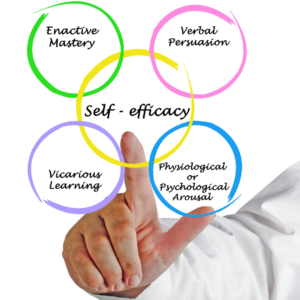Too much confidence or too little? Either way, both have an impact on your self-efficacy and how you reach your goals.
As a child, you have so many ambitions, you let your imagination run away with you and take you to your happiest place. You don’t sit wondering if the next task of your day will be achievable, your excitement overrides all thoughts.
Painting is an activity that all children enjoy; however, there is no thought process beforehand of what they’re going to paint and if they can do it. They let their brush glide across the paper with lots of bright colours forming a picture that will be stuck up on their fridge. Do you understand my point? Their enjoyment and happiness from the activity is the most important factor for their success. So why is it that adults take a huge leap away from this mindset when growing up?

What is self-efficacy?
According to Bandura (1977), self-efficacy is a person’s belief in their ability to influence events which can affect their lives; this can be seen as a person’s motivation to perform particular tasks to get to their goals. It is believed that self-efficacy is a strong determinant of an individual’s effort and perseverance to reach their initial targets.
Growing up is difficult, becoming an adult is difficult. Society expects you to stand on your own two feet and be independent; this is usually the leap of faith that individuals aren’t ready to take in order for them to progress in life and reach their highest goals.
This is where self-efficacy plays its part. Self-efficacy is a construct theorized by Bandura (1960) which is defined as the perception that we have about our ability to perform well in tasks and life situations. Within studies, Bandura (1960) also found out that there is a positive correlation between self-efficacy and an individual’s achievement level in certain tasks. In addition to this, he also found that self-efficacy can play a significant role in achieving and accomplishing your long-term goals. However, this will only happen if you believe in yourself. Self-efficacy is something that only you as an individual can change, if you have a high level of self-efficacy, it will allow you to continue to grow and learn in order to achieve your long-term goal.
Self-efficacy and Confidence
Self-efficacy is defined by Bandura (1977), as people’s beliefs in their ability to influence events that affect their lives. It can also make us overconfident about ourselves and our abilities. Therefore, this causes individuals to stop putting effort into climbing higher up their ladder as they believe that they will get there without having to try. In addition to this, confidence is defined as an individual’s belief in themselves and the ability that they have to meet their challenges and succeed. Self-efficacy and confidence relate closely to one another as they both play a significant part in an individual’s motivation and drive to reach their goals.
Overconfidence can be both a good and a bad thing, depending on the situation. In some situations, overconfident individuals may get more tempted to put themselves in situations that override their ambitions and goals and make them unrealistic. Whether this is only a small temptation or a small break from it, it can easily cause you to stop focussing on what is really important in life. It can further lead to a false sense of self

Strategies to develop self-efficacy
Self-efficacy is based on an individual’s mindset, however there are certain factors which can help to develop an individual’s self-efficacy. These can include:
- Continue to build your successes, stay resilient and work hard. Success isn’t automatic and in life you don’t need to sprint to success. Success comes in all different shapes and forms.
- Surround yourself with positivity, surround yourself with people who have faith in you and believe that you can achieve anything that you put your mind to.
- Manage your own psychological factors, minimize the stress within your life, and any other initial factors which could become a barrier to you reaching your own goals.
- Learn from your role models, they’re supposed to be an inspiration- if they can do it then so can you!

I will never understand the thoughts behind not trying hard because you believe that you’re already at the top. The truth and reality of that situation is that there are still many mountains to climb, you’ve just settled for the closest one. There is always a path in life to keep going, you just need to keep climbing and have faith in yourself. As Miley Cyrus once said, ‘Life’s a climb, but the view is great’. This suggests how strong, powerful, and rewarding it is to make it to your goal. However, in order to get there, you need to work and be motivated for it, otherwise it will remain in the distance.
Your actions affect your whole journey. Work hard and believe in yourself; you WILL reach the top!
To find out more about self-efficacy : Self-Efficacy Theory | Simply Psychology
References:
Bandura, A (1977). Self-efficacy: Toward a Unifying Theory of Behavioral Change. Psychological Review. 84 (2): 191–215.
Bandura, Albert (1977), Social Learning Theory Vol. 1). Englewood Cliffs, NJ: Prentice-hal.
Lopez-Garrido, G (2020, Aug 09). Self-efficacy. Simply Psychology. https://www.simplypsychology.org/self-efficacy.html
About the Author

Daniella Jordan will pursue Sports and Exercise Psychology at University in September 2021. She has competed in Gymnastics and Cheerleading.
Being an athlete was always something special to me. It gave me the confidence to become who I am today and allowed me to express myself while enjoying new opportunities. From a young age, I have been competing in gymnastics and cheerleading. My passion for sports and the happiness it gives me are indescribable.
I want to learn how the athletes manage their emotions, the pressures they are put under and any challenges they face when they compete in the sport. I am excited to learn more!
